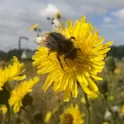‘Science is a measure of our ignorance: the more we know, the more we realize how little we know’
By Dr Gianluca Calcagni, IEM-CSIC Image: Shutterstock.com Writing as part of our Frontier Scientists series, Dr Gianluca Calcagni of IEM-CSIC in Madrid gives us an insight into his research that aims to find answers to some of the most puzzling and complex mysteries that makes up almost everything in the universe. Dr Gianluca Calcagni obtained his degree in physics in Italy at Padua University and, in 2005, his PhD at Parma University. He has worked at a number of research institutes in Japan, the UK, the US, Germany and Spain and is now a faculty member of the Instituto de Estructura de la Materia, Consejo Superior de Investigaciones Científicas (IEM-CSIC) in Madrid. As a member of the LISA and Einstein Telescope consortia, his research areas are gravitational waves, nonlocal quantum gravity, multifractal spacetimes, cosmologies beyond the standard model, and string theory. He has published three books and more than 100 papers in physics since 2003. Since 2016, he has also been doing research in behaviural and clinical psychology, in which he has a degree, an MSc and three published papers. Last year, he was awarded with a Frontiers in Astronomy and Space Sciences Diversity Award for his community engagement as […]














